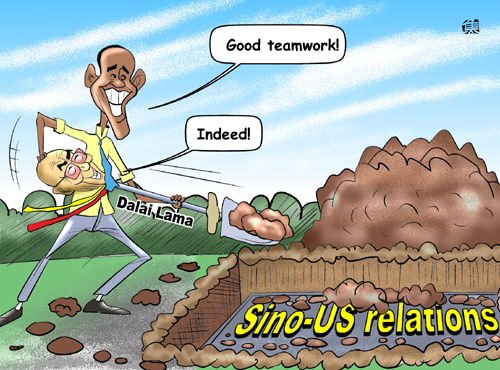What's behind Obama-Dalai Lama meeting?
Despite China's firm and repeated opposition, U.S. President Barack Obama met with the Dalai Lama in Washington on Thursday.
Obama pledged to build "a positive, cooperative and comprehensive U.S.-China relationship for the 21st century" during his high-profile China visit last November, but his pledge has failed to hold water merely three months later.
International observers hold that, through the meeting, Obama wants to achieve his multiple political goals at home and abroad, while the Dalai Lama pursues his illusion to split China in the guise of religion.
Then what's the real motive for Thursday's meeting between the two?
 |
| A harmonious relationship [By Jiao Haiyang/China.org.cn] |
Tibet card - Washington's unchanged policy toward China
In 1991, then U.S. President George H. W. Bush became the first U.S. president that met the Dalai Lama. There had been 11 meetings between U.S. presidents and the Dalai Lama before Obama took office.
Obama promised to bring change to America during his election campaign, yet change is not seen on the issue of meeting the Dalai Lama. Why?
The Japanese monthly magazine Choice was right to the point in describing Obama's move as playing the Tibet Card in an attempt to get out of the administration's political and economic plight at home and abroad.
By playing the Tibet Card at such a juncture, Obama is trying to shift the attention of both supporters and opponents when he is faced with a sagging economy and a much tougher midterm election for the Democrats.
Ted Carpenter, vice president for defense and foreign policy studies at the Cato Institute, said Obama was trying to hold sway and win over the political constituencies in both the Democrat and Republican camps before November.
He said that Obama was under "considerable pressure from domestic political constituencies," including pressure from his own party on issues related to Tibet.
"The meeting is a way to gain favor with those constituencies" that "support the Dalai Lama and are not fond of China," he added.
In the view of Martin Jacques, a senior scholar at the London School of Economics, Obama's move reflected his worries about the decreasing U.S. influence and the increasing influence of China on the international arena.
The global financial crisis has led to a change in the balance of power. While the strength of the United States is declining, China is on the rise, he said.
Pierre Picquart, an expert on China from the University of Paris, said Obama's meeting with political figures such as the Dalai Lama was intended to set up a barrier to China's development while securing the U.S. dominance in the world.
 0
0 






